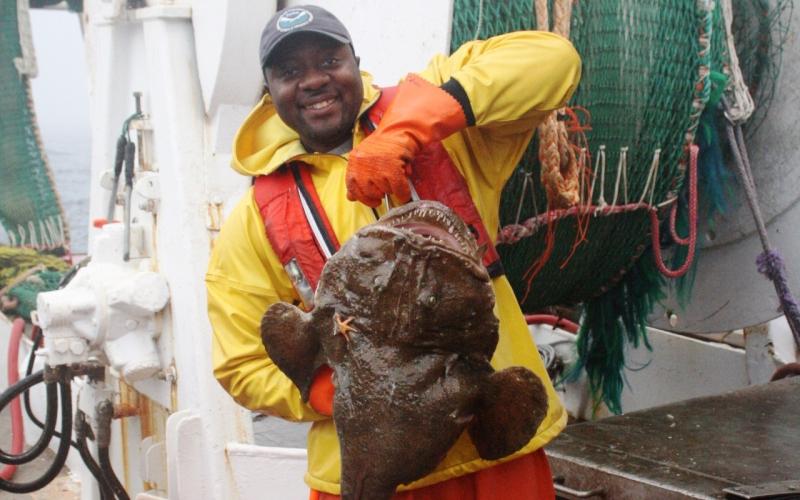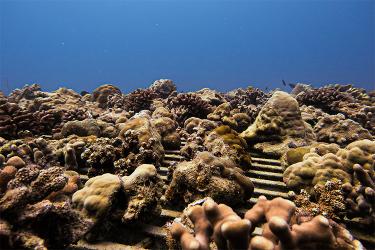Where did you grow up?
I was born in the twin island republic of Trinidad and Tobago, the most southern islands in the Caribbean island chain. I grew up in Speyside, an idyllic fishing village on the eastern coast of Tobago. My childhood home is just a five minute walk to the beach. Both my parents were hard workers, my mom was a kitchen assistant at a local hotel and the homemaker. My dad worked for the local public utilities and was a commercial fisherman on the side. I remember going fishing with him on Saturday mornings out of his 22-foot pirogue, trolling for wahoo, blackfin tuna, mahi mahi, and other pelagic fish. He would alternate taking my younger brother and myself out fishing. My brother and I took it seriously — there were bragging rights involved! Being the eldest of six, I was also mom’s helper in the kitchen and I proudly assisted with cooking and baking until those tasks were passed on to a younger sibling. All of my family members still reside in Trinidad and Tobago.
Where did you go to school and what subject did you get your degree(s) in?
I was awarded a National scholarship to attend the Eastern Caribbean Institute of Agriculture and Forestry, now under the university umbrella of University of Trinidad and Tobago. I completed the Diploma of Agriculture program then worked in various capacities in the Division of Agriculture and the Department of Marine Resources and Fisheries. Since the University of Trinidad and Tobago, didn’t offer undergraduate degrees in fisheries science, I left Trinidad and Tobago to complete my bachelor’s degree in Aquaculture and Fisheries Technology at the University of Rhode Island.
Tell us a little about how you came to the Science Center.
I was a fisheries observer for two and a half years. During that time, I was certified to cover pretty much every fishing gear in the Northeast and Mid-Atlantic regions and to evaluate new observers on training trips. From Newport News, Virginia, to Rockland, Maine, I work onboard all kinds of commercial fishing vessels ranging from a simple gillnetter, to high volume pair trawlers and purse seiners. The training and experience of being an observer was priceless—it helped me develop a working knowledge of the various fisheries in our region and allowed me establish great working relationships with fishing industry stakeholders. In December 2012, I moved to the Cooperative Research Branch where I still interact with the fishing industry but in a different capacity.
What do you do at the Science Center?
I am a field scientist based out of the Narragansett Lab in Narragansett, Rhode Island. I’m part of a team that work with our contracted study fleet and partner institutions. I provide support for vessels using Fisheries Logbook and Data Recording Software (FLDRS) for Electronic Vessel Trip Reporting (eVTR) by training captains, equipment installation, and troubleshooting issues that pop up from time to time. Our FLDRS and eVTR equipment ranges from computers and temperature and depth loggers, to things like bluetooth receivers. This equipment not only provide much needed data to our Science Center, but it also provides temperature and depth profiles for the fishermen to use to help them make informed fishing decisions. Obviously there’s a lot of face-to-face interaction with the commercial fishing vessel owners, captains, and crew. These kinds of interactions provide valuable feedback, improving FLDRS and our relationship with industry. I also assist captains navigating the eVTR process, error correcting, and data querying of their eVTR data. Another core responsibility I have is collecting and managing the eVTR data we use to better manage our region’s fisheries. Our scientists use fishing catch and effort, GPS data, temperature and depth data to look at how species distribution could be affected by rising ocean temperatures. This information collected through eVTR is used in fisheries management strategies.
On the administrative side of things I do some inventory control, ensuring that our safety and oceanographic equipment are all up to date, working properly, and available to our staff at our Woods Hole, Narragansett, and Sandy Hook Labs. Recently, I’ve started participating on a new communications working group at the Science Center developed to enhance our ability to communicate our science to the public and key stakeholders.
I still enjoy getting my hands dirty and work on commercial fishing vessels to collect important data like catch composition and lengths and weights, as well as biological samples used in fish ageing and histology. I also staff our Science Center surveys such as our Gulf of Maine bottom longline survey in the Spring and Fall, as well industry collaborated surveys such as the gear efficiency and comparison surveys.
What you like most about your position?
My greatest satisfaction in my job comes from being able to create opportunities for stakeholder engagement and relationship building. My position allows me to collect and scientifically quantify anecdotal data that in the past would have been communicated verbally and wouldn’t be able to be used in the fisheries management process. This ultimately helps create more buy-in with our stakeholders as they’re part of the process and not separate from it. I also like the combination of duties spread across office work, field work and time at sea — I have a greater appreciation of how data travels from the field to the end user. From a purely nostalgic standpoint, my job keeps me connected to the sea, that fishing village I grew up in, and my dad.
What are some of your hobbies?
Most of my hobbies are outdoor activities. I started cycling about six years ago and enjoy riding the scenic roads and bike paths in New England. I would typically cover over 1200 miles per year, my all time best was 3300 miles in 2015!
I also enjoy photography, I see myself as an amateur photographer and I do minor photo editing and enhancement. I would capture images our work while at sea on surveys, sporting events, and other subjects of nature.
My most gratifying hobby is that of a beekeeper. I currently have five hives which is an increase from the two hives when I first started three years ago. I’ve actually given names to the hives and in conversations I refer to them by name. There’s never a dull moment when managing bees as these social insects continue to amaze me. The beauty of having bees in your backyard is that you contribute to our food security via pollination and you get to harvest the honey. A few weeks ago I won two prizes at the Rhode Island Beekeepers Association annual honey show. I won a silver medal for honey in the light amber color category and a gold medal for honey in the amber color category. The categories are related to the seven color grades set by the USDA. In general, the color indicates the strength of the flavor of honey with darker honey tasting stronger than light. There are of course some exceptions — taste and preference being very subjective.



